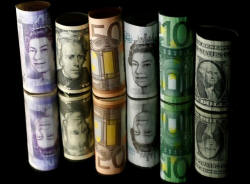Catalonia worries knock euro against stronger dollar
 Send a link to a friend
Send a link to a friend
 [October 02, 2017]
By Jemima Kelly [October 02, 2017]
By Jemima Kelly
LONDON (Reuters) - The euro slipped on
Monday after a violence-marred independence vote in Spain's Catalonia
region fueled anxiety over political risk in the euro zone, and as a
renewal of the "Trumpflation trade" lifted the dollar across the board.
Data showing factories across the euro zone enjoyed their most
productive month since early 2011 in September could provide no support
to the single currency, which slipped 0.7 percent to $1.1730 <EUR=>,
close to its lowest in six weeks.
Investors were watching the political situation in Spain nervously,
after police used batons and rubber bullets to try to prevent Sunday's
banned vote in a show of force that left hundreds injured.
Spanish Prime Minister Mariano Rajoy now faces the country's biggest
constitutional crisis in decades, with newspaper editorials saying the
ballot - in which Catalan officials said 90 percent of voters had chosen
to leave Spain - had set the stage for a decisive clash with Madrid.

"After the French election, a lot of risk premium was priced out of
Europe... but now we have another against-the-status-quo European vote,
so for financial markets, political risks in Europe have increased,"
said UBS currency strategist Constantin Bolz, in Zurich.
"There will be a little bit of noise going through the week, but overall
our expectation is that it will not have a dramatic, long-lasting
impact," he added.
Against the Swiss franc, often bought at times of uncertainty, the euro
dipped to its weakest in three weeks at 1.13885 francs per euro <EURCHF=>.
U.S. FISCAL STIMULUS HOPES
Data on Friday showed speculators' net short bets on the dollar rose to
their largest since late September 2012. [IMM/FX]
[to top of second column] |

Dollar, Euro and Pound banknotes are seen in this picture
illustration taken April 28, 2017. REUTERS/Dado Ruvic/Illustration

But the dollar last week recorded its strongest weekly performance of 2017,
lifted by a renewed expectations that U.S. President Donald Trump would deliver
the fiscal stimulus he had promised.
The greenback has also been boosted by the view that the Federal Reserve would
hike interest rates again before the end of the year, and might be turning more
hawkish.
The index that tracks the dollar against a basket of six major currencies added
0.6 percent to 93.588 <.DXY>.
Against the yen, the dollar rose 0.3 percent to 112.84 <JPY=>.
Data released earlier on Monday showed Japan's big manufacturers were the most
confident about the business outlook in a decade in the last quarter, in a sign
the country's economic recovery may be gathering steam.
The figures could also help Prime Minister Shinzo Abe as he tries to convince
voters in an Oct. 22 election that his "Abenomics" stimulus policies have
improved their livelihoods, analysts say.
"If the results are perceived as a bad outcome for Abe's party, then some
investors might view it as the beginning of the end of his 'Abenomics,' meaning
the end of the yen-weakening trend," said Masafumi Yamamoto, chief forex
strategist at Mizuho Securities.
"But there is another possibility as well, with both parties calling for
stimulus steps, which some people think might lead to 'helicopter money,' so
then they might sell yen."
(Reporting by Jemima Kelly; Additional reporting by Lisa Twaronite; Editing by
Gareth Jones)
[© 2017 Thomson Reuters. All rights
reserved.] Copyright 2017 Reuters. All rights reserved. This material may not be published,
broadcast, rewritten or redistributed.
 |